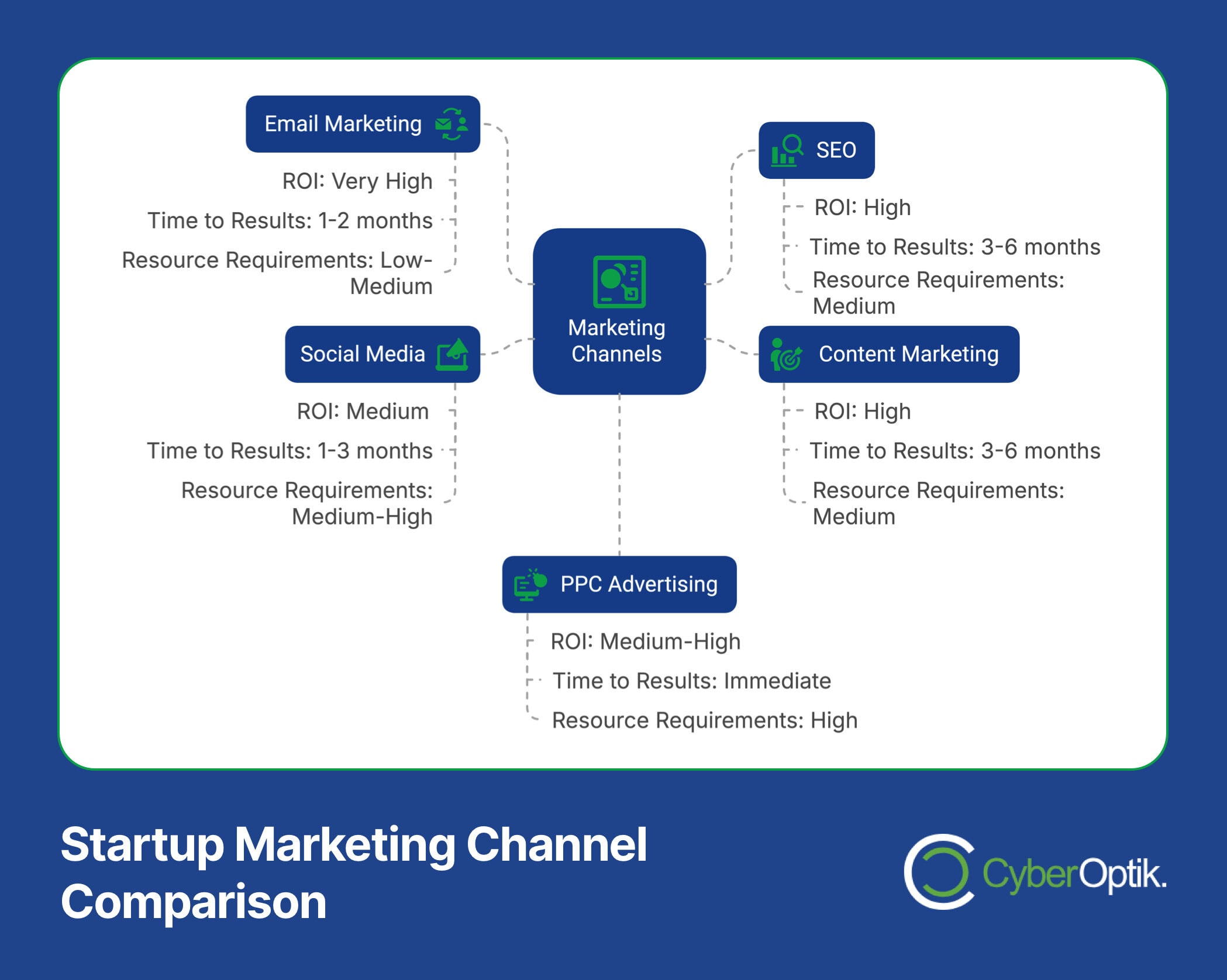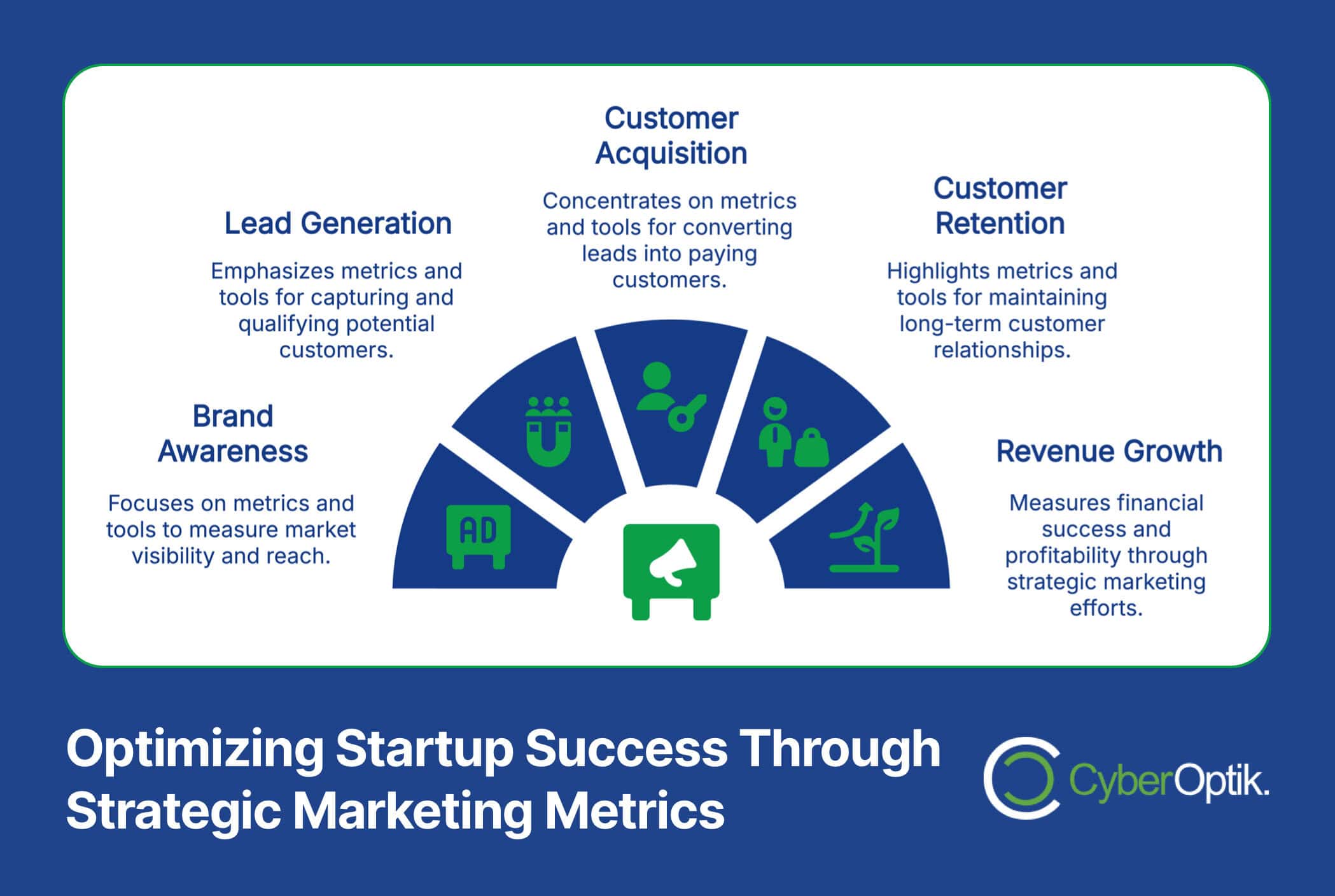Starting a new business is both exhilarating and challenging. Among these challenges, effective marketing often proves especially difficult for startups. Why? Limited budgets, fierce competition, and scarce resources create significant hurdles. Most startup founders understand the importance of marketing yet struggle to implement it effectively.
Statistics reveal this reality clearly. While 65% of small businesses ultimately become profitable, the journey isn’t easy. (Source: Luisa Zhou) Many startups fail before reaching sustainability, with 38% of failures attributed directly to funding and cash flow issues. (Source: Exploding Topics)
The right marketing approach can make all the difference between startup success and failure. This guide explores proven marketing strategies specifically tailored for startups. We’ll examine cost-effective techniques, channel prioritization, and measurement approaches that maximize limited resources. Let’s discover how to build a marketing foundation that drives sustainable growth for your new venture.
Why Strategic Marketing Matters for Startup Success
Marketing isn’t just an expense—it’s an investment in your startup’s future. Strategic marketing creates visibility, builds credibility, and generates the leads necessary for growth. Without it, even revolutionary products can fail to gain traction in the marketplace.
The data supports this connection between marketing and startup success. Research shows that 71% of failed startups began scaling their marketing efforts before achieving product-market fit. (Source: 2Acre Studios) This reveals a critical lesson: marketing must align with your startup’s stage of development.
Successful startups approach marketing methodically. They identify their target audience, develop clear messaging, and choose appropriate channels before scaling efforts. This foundation prevents wasted resources and maximizes impact from limited marketing budgets.
The most effective marketing strategies for startups balance short-term needs with long-term growth. While immediate revenue generation matters, building brand awareness and customer relationships creates sustainable success. This balanced approach helps startups weather market fluctuations and build resilience against larger competitors.
Understanding Your Startup’s Marketing Needs
Before implementing specific tactics, startups must understand their unique marketing requirements. This foundation ensures that every marketing dollar generates maximum return. Let’s explore the three critical components of this foundation.
Defining Your Target Audience
Knowing exactly who needs your product or service forms the cornerstone of effective marketing. Many startups waste resources by targeting audiences that are too broad or poorly defined. Precise audience definition leads to more relevant messaging and better conversion rates.
Research reveals that 88% of shoppers consult reviews before making purchase decisions. (Source: Bazaarvoice) This highlights the importance of understanding how your specific audience researches and makes decisions. When you know these patterns, you can position your marketing where it will have the greatest impact.
Here are the key factors to consider when defining your target audience:
- Demographic information (age, gender, income, location)
- Psychographic characteristics (values, interests, lifestyle)
- Pain points and challenges they’re looking to solve
- Decision-making process and purchasing patterns
- Content consumption habits and preferred channels
Create detailed buyer personas based on these factors. These fictional representations of your ideal customers help focus all marketing efforts and ensure consistency across channels.
Establishing Marketing Objectives
Clear objectives guide your marketing strategy and provide benchmarks for measuring success. Vague goals like “increase brand awareness” don’t provide the specificity needed for effective planning and evaluation.
Effective marketing objectives for startups should be:
- Specific – Clearly defined outcomes
- Measurable – Quantifiable targets
- Achievable – Realistic given your resources
- Relevant – Aligned with business goals
- Time-bound – With defined timeframes
For example, rather than “get more customers,” a better objective would be “acquire 50 new customers through digital marketing channels within the next quarter.” This specificity creates accountability and helps measure return on marketing investment.
Assessing Your Marketing Resources
Realistic resource assessment prevents overextension and disappointment. Small business owners spend an average of 20 hours per week on marketing activities. (Source: Luisa Zhou) This significant time investment highlights the importance of focusing on high-impact activities.
Consider these three resource categories when planning your marketing strategy:
- Financial resources – Available budget for marketing activities
- Human resources – Team members, their skills, and available time
- Technical resources – Tools, platforms, and technologies at your disposal
This assessment helps identify gaps that might require outsourcing or additional investment. It also prevents the common startup mistake of attempting too many marketing initiatives simultaneously with insufficient resources.
Essential Marketing Strategies for Resource-Conscious Startups
With limited resources, startups must focus on high-ROI marketing strategies. Not all marketing approaches deliver equal value, especially during early growth stages. Let’s explore the most effective strategies for maximizing impact while minimizing investment.

Content Marketing: Building Authority on a Budget
Content marketing creates lasting value while establishing your startup as an authority in your industry. Studies show that startups with content strategies generate 67% more leads than those without content plans. (Source: 2Acre Studios) This approach provides compounding returns as content continues working for your business long after creation.
The most effective content marketing for startups focuses on solving customer problems rather than promoting products. Avoiding common content marketing myths helps startups create material that genuinely resonates with their audience. When you consistently provide value, you build trust that eventually translates to sales.
Effective content marketing types for startups include:
- Blog posts addressing customer pain points and questions
- Educational guides establishing expertise in your field
- Case studies demonstrating real-world success
- Video tutorials explaining complex concepts simply
- Infographics making data accessible and shareable
The key is consistency and quality over quantity. A sustainable content calendar that delivers genuine value builds audience relationships that pay dividends throughout your startup’s growth journey.
Email Marketing: High ROI with Low Investment
Email marketing remains one of the most cost-effective channels for startups. The numbers speak for themselves: email marketing generates $42 for every $1 spent, making it the highest ROI digital channel available. (Source: Startup Bonsai) This exceptional return makes email marketing essential for resource-conscious startups.
Unlike social media platforms where algorithm changes can instantly reduce your reach, email provides direct access to your audience. This owned channel gives startups greater control over their marketing destiny while building valuable first-party data.
Follow these email marketing best practices for startup success:
- Build quality lists through legitimate opt-in methods
- Segment your audience for more relevant messaging
- Focus on providing value before requesting sales
- Create mobile-friendly templates for better user experience
- Test subject lines and content to improve performance
Email effectiveness comes from relationship building, not persistent sales pitches. Startups that focus on solving customer problems through email content see higher open rates, better engagement, and ultimately stronger conversion rates.
Leveraging User-Generated Content for Startup Growth
User-generated content (UGC) provides authentic social proof while reducing content creation burdens for resource-limited startups. This powerful strategy leverages your customers to tell your story, often more convincingly than you could yourself.
Research confirms UGC’s persuasive power: 85% of consumers find UGC more influential than content created by brands themselves. (Source: Bazaarvoice) This authenticity helps startups overcome the credibility gap that often exists with new, unproven businesses.
UGC campaigns also deliver impressive marketing performance metrics. When implemented correctly, UGC ads achieve 4x higher click-through rates compared to traditional advertising. (Source: Bazaarvoice) This improved performance makes UGC especially valuable for startups with limited marketing budgets.
Creating a successful UGC strategy requires active facilitation. Startups should:
- Make sharing easy with branded hashtags and submission guidelines
- Provide incentives for customers to share their experiences
- Highlight and celebrate customer content across channels
- Request permission before repurposing customer content
- Measure UGC impact on trust metrics and conversion rates
The most successful UGC campaigns feel organic rather than manufactured. They showcase real customer experiences, addressing concerns potential customers might have about working with a new company.
Digital Marketing Channels That Deliver Results for Startups
Channel selection significantly impacts marketing effectiveness for startups. Research shows that 75% of startups use two or fewer marketing channels, highlighting the importance of strategic channel selection. (Source: Luisa Zhou) With limited resources, focusing on the right channels becomes critical.
The digital marketing landscape offers numerous options, but not all provide equal value for early-stage companies. However, adoption remains high across the board, with 96% of small businesses using social media as part of their marketing strategy. (Source: NerdWallet) This widespread usage emphasizes the importance of digital approaches for modern startups.
The following table compares key digital marketing channels based on factors most relevant to resource-conscious startups:
| Marketing Channel | Typical Startup ROI | Time to Results | Resource Requirements | Best For |
|---|---|---|---|---|
| SEO | High | 3-6 months | Medium | Long-term growth |
| Social Media | Medium | 1-3 months | Medium-High | Brand awareness |
| PPC | Medium-High | Immediate | High | Quick results |
| Email Marketing | Very High | 1-2 months | Low-Medium | Customer retention |
| Content Marketing | High | 3-6 months | Medium | Authority building |
This comparison helps startups select channels that align with their specific goals, timelines, and available resources. Let’s examine the most effective channels in detail.
Search Engine Optimization (SEO)
SEO provides sustainable organic traffic without ongoing ad spend. This long-term approach delivers significant value over time, with SEO leads achieving a 14.6% close rate compared to just 1.7% for outbound leads. (Source: Startup Bonsai) This substantial conversion difference makes SEO particularly valuable for startups.
Effective startup SEO focuses on:
- Targeting long-tail keywords with less competition
- Creating high-quality content addressing customer questions
- Optimizing for local searches when geographically relevant
- Building credibility through quality backlinks
- Ensuring technical optimization for better user experience
While SEO takes time to produce results, the compounding value it creates makes it worth the initial investment for most startups. As rankings improve, the cost per acquisition typically decreases, creating expanding margins over time.
Social Media Marketing for Startups
Social media provides startups with affordable visibility and community-building opportunities. Consumer behavior supports its importance, with 74% of consumers relying on social media to guide purchasing decisions. (Source: NerdWallet) This influence makes social media an essential channel for building brand awareness.
Platform selection matters significantly. Data shows that 69.6% of startups actively use Facebook in their marketing efforts. (Source: Mayple) However, effectiveness varies by industry and target audience demographics. Research your specific audience’s platform preferences before investing significant resources.
Successful startup social media strategies:
- Focus on 1-2 platforms where your audience is most active
- Create authentic, value-focused content rather than constant promotions
- Engage directly with followers to build community
- Leverage platform-specific features like Stories and Live video
- Maintain consistent posting schedules with quality over quantity
Social media success requires patience and consistency. The relationship-building nature of these platforms means results typically improve over time as your audience and engagement grow.
Pay-Per-Click Advertising
PPC advertising offers immediate visibility and precise targeting capabilities. Unlike organic methods, PPC can drive qualified traffic from day one. This immediacy makes it valuable for testing concepts, launching products, or generating early revenue.
PPC becomes even more cost-effective when combined with user-generated content. Campaigns utilizing UGC experience an average 50% reduction in cost-per-click compared to traditional advertising approaches. (Source: Bazaarvoice) This significant cost reduction helps startups maximize limited advertising budgets.
For startups considering SEO versus PPC investment, understanding the strengths and limitations of each approach is essential. While SEO offers better long-term value, PPC provides the immediate results often needed in early growth stages.
Effective startup PPC strategies include:
- Starting with highly targeted campaigns focused on bottom-funnel keywords
- Setting strict daily budgets to prevent overspending
- Creating dedicated landing pages for conversion optimization
- Continuously testing ad copy and creative elements
- Monitoring quality scores to improve ad positioning and costs
PPC works best as part of an integrated strategy rather than in isolation. The immediate data it provides can inform other marketing channels while generating initial revenue.

Marketing Budget Allocation for Startups
Budget allocation significantly impacts marketing success for resource-limited startups. Research indicates that 47% of startups spend less than $10,000 annually on digital marketing. (Source: Luisa Zhou) This limited investment makes strategic allocation essential for meaningful results.
The most successful startups treat marketing as an investment rather than an expense. Data shows that thriving startups typically allocate 12-20% of their budget to marketing activities, compared to just 5-7% for struggling companies. (Source: 2Acre Studios) This significant difference highlights marketing’s role in driving growth.
Investors also recognize marketing’s importance in startup success. Studies reveal that 82% of investors consider marketing strategy when making funding decisions. (Source: 2Acre Studios) This investment perspective reinforces the need for thoughtful marketing budget planning.
The table below shows recommended budget allocation percentages based on common startup growth stages:
| Growth Stage | % of Revenue to Marketing | Channel Focus | Primary Objective |
|---|---|---|---|
| Pre-Product/Market Fit | 15-25% | Content, SEO, Email | Audience building |
| Initial Traction | 20-30% | PPC, Content, Social | Customer acquisition |
| Growth Phase | 15-25% | Balanced approach | Scaling customer base |
| Established Phase | 10-15% | Retention-focused mix | Loyalty and referrals |
These percentages provide general guidance, but actual allocation should reflect your specific business model, industry, and growth objectives. Regular review and adjustment based on performance data maximizes return on marketing investment.
Measuring Marketing Success: Key Metrics for Startups
Effective measurement separates successful startup marketing from wasteful spending. However, measurement challenges are common, with 73% of startups uncertain about their marketing strategy’s effectiveness. (Source: Luisa Zhou) This uncertainty highlights the need for clear metrics and tracking systems.
The right metrics depend on your specific marketing objectives and channels. However, understanding digital marketing ROI compared to traditional approaches helps startups make informed decisions about where to invest limited resources.
When implementing user-generated content strategies, measure their specific impact. Data shows UGC campaigns achieve 29% higher web conversions compared to campaigns without user-generated content. (Source: EveryoneSocial) This significant performance difference makes tracking UGC effectiveness particularly important.
The following table outlines essential marketing metrics for different startup objectives:
| Marketing Objective | Key Metrics | Measurement Tools | Evaluation Frequency |
|---|---|---|---|
| Brand Awareness | Impressions, Reach, Share of Voice | Social Analytics, Brand Monitoring Tools | Monthly |
| Lead Generation | Conversion Rate, Cost Per Lead, Lead Quality Score | CRM, Google Analytics | Weekly |
| Customer Acquisition | Customer Acquisition Cost (CAC), Conversion Rate, Close Rate | CRM, Analytics, Attribution Software | Weekly/Monthly |
| Customer Retention | Retention Rate, Customer Lifetime Value, Repeat Purchase Rate | CRM, Customer Analytics | Monthly/Quarterly |
| Revenue Growth | ROI, Revenue Attribution, Average Order Value | Financial Software, CRM, Analytics | Monthly |
Avoid the common startup mistake of tracking vanity metrics that don’t connect to business outcomes. Follower counts and website traffic matter only if they convert to measurable business results. Focus instead on metrics directly tied to revenue and growth objectives.
Building a Sustainable Marketing Strategy
Long-term success requires moving beyond tactical marketing to building sustainable strategies. Startups with systematic marketing processes are 318% more likely to succeed compared to those with ad-hoc approaches. (Source: 2Acre Studios) This dramatic difference demonstrates the value of methodical marketing planning.
Sustainable marketing strategies balance immediate needs with long-term brand building. While short-term tactics generate quick results, they rarely create lasting competitive advantages. Successful startups integrate both approaches, using short-term tactics to fund longer-term initiatives.
The following table identifies common startup marketing pitfalls and their solutions:
| Common Pitfall | Impact on Startup | Sustainable Solution |
|---|---|---|
| Channel hopping without strategy | Wasted resources, inconsistent results | Develop channel strategy based on audience research |
| Focusing solely on acquisition | High churn, poor customer lifetime value | Balance acquisition with retention initiatives |
| Neglecting data collection | Inability to optimize and improve | Implement proper tracking from day one |
| Inconsistent brand messaging | Confused audience, weak positioning | Create brand guidelines and messaging frameworks |
| Copying competitor tactics | Lack of differentiation, poor results | Develop unique positioning based on strengths |
Creating an effective marketing roadmap helps startups avoid these pitfalls while building momentum. Follow these steps to develop your sustainable marketing plan:
- Audit current position – Assess strengths, weaknesses, and results to date
- Set clear objectives – Define specific, measurable goals for each quarter
- Identify key channels – Select 2-3 primary channels based on audience research
- Create content calendar – Plan consistent content delivery across channels
- Establish measurement framework – Define KPIs and reporting processes
Going Deeper
To create truly sustainable growth, explore fresh strategies for improving website user experience that can significantly impact conversion rates and customer satisfaction.
Review and adjust your marketing roadmap quarterly based on performance data. This regular reassessment ensures your strategy remains aligned with changing market conditions and business objectives.
Conclusion
Effective marketing provides the foundation for startup success in competitive markets. The strategies outlined in this guide—content marketing, email campaigns, user-generated content, and targeted digital channels—offer resource-conscious startups powerful tools for growth. Implementation quality matters more than quantity, with focused execution of fewer strategies typically outperforming scattered efforts across many channels.
Remember that marketing represents an investment in your startup’s future rather than a simple expense. The most successful startups allocate adequate resources to marketing while measuring results rigorously. This data-driven approach ensures continuous improvement and optimal resource allocation over time.
Start by implementing one or two strategies from this guide based on your specific business objectives and audience characteristics. Focus on execution quality, measure results carefully, and expand your marketing efforts methodically as you generate positive returns. With consistent application of these principles, your startup can build a marketing engine that drives sustainable growth and competitive advantage.




